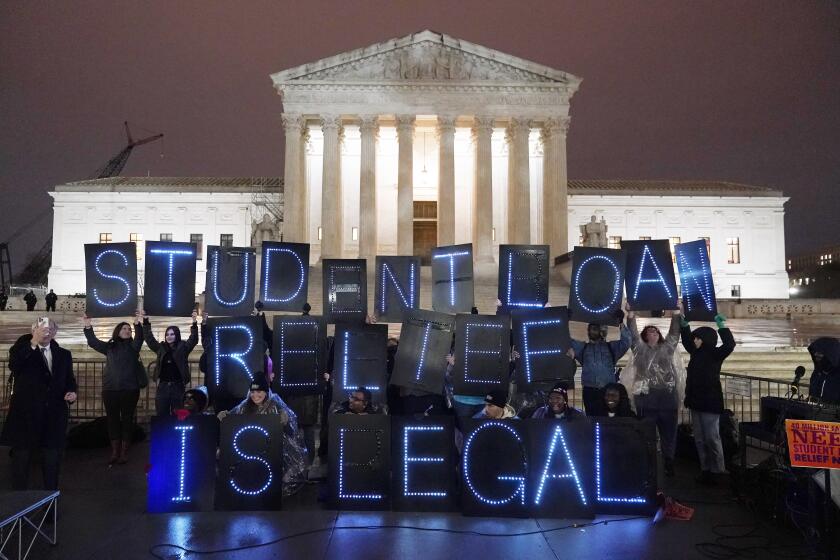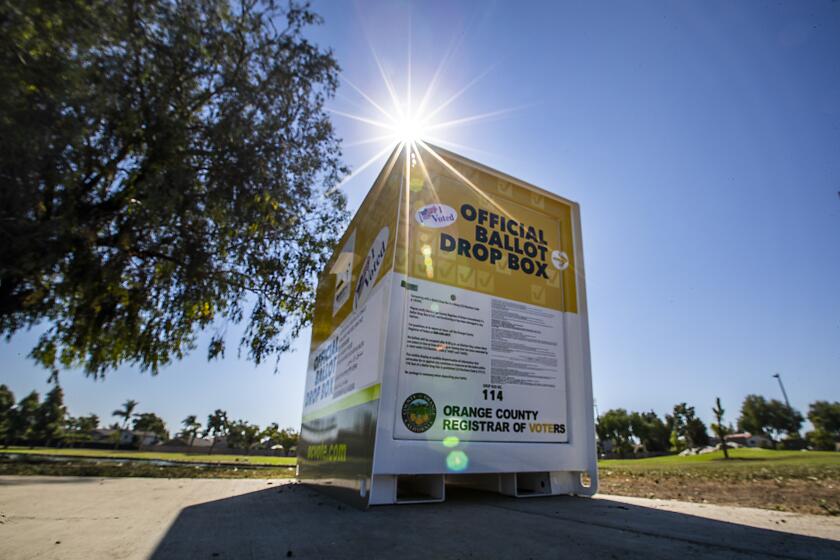More Notes From the CLAS Struggle
Got a call from Debbie Greenfield the other day. She wanted to thank me for “not making us look like idiots.”
She said this with a friendly laugh. I appreciated the call, for although I don’t agree with everything Debbie has to say, I didn’t mean to portray her as, well, you know.
Debbie Greenfield is a West Hills parent who sued the Los Angeles Unified School District, alleging that the California Learning Assessment System (CLAS) test is an invasion of privacy. My idea was to let Debbie state her case and let the chips fall where they may. “A Sneak Attack on the American Family,” the headline that appeared over my column Thursday, summarizes Debbie’s opinion about the CLAS test.
That’s not my opinion, though. I am more inclined to believe Superior Court Judge Ronald H. O’Brien, who rejected the claim that CLAS violates state privacy laws. When it comes to CLAS, fears of Big Brother don’t bother me as much as the state’s insistence that the test contents be confidential.
In coming to his opinion, Judge O’Brien has an advantage over both Debbie Greenfield and myself. He’s read the test. The rest of us haven’t.
*
Confidentiality--”secrecy,” the critics say--is the great sticking point in the CLAS struggle. People fear the unknown; it’s only natural. Confidentiality has served to benefit CLAS critics, fostering distrust, fear--even hysteria. Opponents have all but portrayed CLAS as a mysterious ticking package that, upon its opening, releases a kind of nerve gas that will cause children to rebel against their parents.
This is how Judge O’Brien framed the dilemma: “The very nature of a ‘test’ requires that they be kept confidential, at least before it is given to the students. Otherwise the test would lose its purpose. On the other hand, if the test is kept confidential, parents of students have no way, short of a lawsuit, to . . . insure that no question asks the prohibited subjects.”
Alas, Judge O’Brien doesn’t help much in explaining the need for confidentiality.
Once upon a time, when parents had more faith in the schools, the need for confidentiality would be easy for the public to grasp. In these faithless days, the quick rationale offers little satisfaction. Worse, it inspires resentment. The implication is that the schools are afraid that parents who preview the test will coach and drill their children--that, in effect, cheating will result. If you won’t trust me that much, parents say, why should I trust you?
Trust is a two-way street. Educators have to do a better job of explaining the need for keeping the test questions out of public view. For two days I asked a series of state Department of Education officials to explain the need for confidentiality. To them the reason is so obvious they seem puzzled to receive an argument.
“Of course the tests are confidential! Tests are always confidential!”
Come on, I say. If I walked into a teacher’s classroom and saw the next day’s test on the desk, would the teacher freak out? If a parent saw a geography quiz, is that such a big deal?
“The SATs are confidential! If the SATs weren’t confidential, they’d be useless!”
True enough. But CLAS isn’t the SAT, is it? We’re not talking about a test that may decide whether junior goes to Princeton or Cal State Northridge. Or are we?
“But the business leaders and the governor endorsed CLAS! It had broad support until all this happened! The parents are being exploited by right-wingers who want to undermine public education!”
I don’t want analogies or endorsements or tit-for-tat attacks on opponents. Nor do I want reminders of how politicians who backed CLAS are now cutting and running. All I want is someone to walk me through a detailed, point-by-point explanation of why, say, a copy of the CLAS test can’t be kept in each principal’s office for parents to review.
Finally, Susie Lange, a Department of Education spokeswoman, was able to help. The key in understanding CLAS, she explained, is in understanding its aim--to analyze the ability of students to think and reason, not merely to memorize. The idea is to assess education reforms that have emphasized more reading and writing. CLAS shuns multiple-choice questions in favor of “open-ended” questions that require students to think for themselves--to come up with their own answers.
Confidentiality ensures that test accomplishes its aim. It ensures that the students are giving a spontaneous answer, rather than parroting something a teacher or parent has told them. It ensures that teachers and parents alike won’t “teach to the test.”
The criticism is frustrating. “We went through 40 years of the CAP test where nobody ever asked to see the stupid thing,” Lange muttered. “. . . We’re not trying to get kids to know how to memorize. We’re trying to get kids to think on their feet.”
*
There may be no convincing Debbie Greenfield, but educators are hoping that CLAS will have the chance to prove itself.
Even now, Lange says, officials are wrestling with the question of how much more needs to be revealed to reassure parents that CLAS is no bogyman. The problem, Lange says, is that the state simply doesn’t have enough money to reveal the whole test after the fact. To do so would require the creation of new test questions--an expensive proposition.
In the meantime, Debbie Greenfield tells me that parents tell her they’re having their kids take the test, if only to find out what the questions are.
Apparently, they aren’t yet convinced that CLAS is a threat to the American family.
Scott Harris’ column appears Tuesday, Thursday and Sunday.



